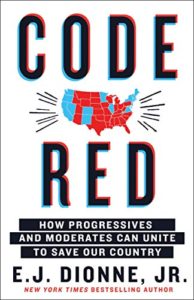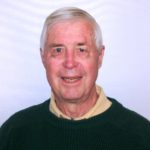 Would you be eager to read a book that is sub-titled “How Progressives and Moderates Can Unite to Save Our Country?
Would you be eager to read a book that is sub-titled “How Progressives and Moderates Can Unite to Save Our Country?
If you lean to the right, probably no; to the left, sure. But as I am a determined independent, I paused.
Dionne is a well-known commentator on evening news programs, a columnist for the Washington Post, and on the faculty of both Georgetown and Harvard Universities. Whenever I have heard him on the news he has been clear, challenging and articulate. So I read this book.
We seem to hear nothing but complaints and savage accusations these days, gloom and potential doom; the few of “us” fighting of all of “them.” Dionne opens his treatise with “a spirit of hope, but with a sense of alarm.” Not “doom” but alarm. And that dual sense dominates his entire argument.
He writes, “In a democracy, there are no final victories – or defeats.” We simply evolve imperfectly and with stuttered steps. Dionne suggests that one possible course of action is to try and enlist two “groups” – the moderates and the progressives – to work more closely together for necessary changes in this country.
First, a problem of labels: why are we so willing to plant a defining title on almost everyone? This denies the inherent complexity of each one of us.
Far too often we are assigned a label: left; right (but not up or down!); alt-right; conservative; moderate; progressive; lefty; socialist. The Scandinavian states are labeled “socialist” but many of us might well prefer to live in those societies rather than in our tumultuous group of states.
Dionne notes “… our tendency to confuse labels and reality,” denying our natural human individuality. We are also too quick to assign each one of us to a “class,” another artificial sorting that brings confusion and increasing distance.
Well into his thesis, Dionne quotes Stephen Pearlstein, “ The wealth of nations depends on the vigorous pursuit of self-interest by individuals whose natural and productive selfishness is tempered by moral sentiments such as compassion, generosity and a sense of fair play.” That’s our continuing difficulty: dealing with our natural human altruism and selfishness.
Dionne doesn’t dump all those to his right, but he suggests a first step begin with bringing two “groups” together in an effort to change things. His three themes: First, “a more democratic political structure” reducing the power of money and “the influence of the connected”. Second, addressing “the fraying of community and family bonds”, and third, to “experiment with more ambitious regional and place-based policies”.
In other word, decentralize: more responsibility for states, cities, and towns. It is “our obligation to challenge a system that guarantees only the freedom that money can buy.” Dionne’s suggestion: “the politics of visionary gradualism.” Slow but sure …
Dionne wants to replace a nation of numerous and fractious labels, snarling at each other through social media, with “a sense of ‘we’ … belonging and connectedness … provide the fiber for a health democratic polity.” This requires mutual respect and a willingness to listen, politely, to each other.
Is this possible? Dionne concludes his challenge, “This book offers what might be called articles of conciliation … We must learn to say, ‘We’ about all of our fellow-citizens – and mean it.”
Time to start?
Editor’s Note: ‘Code Red’ by E. J. Dionne is published by St. Martins Press, New York 2020

About the Author: Felix Kloman is a sailor, rower, husband, father, grandfather, retired management consultant and, above all, a curious reader and writer. He’s explored how we as human beings and organizations respond to ever-present uncertainty in two books, ‘Mumpsimus Revisited’ (2005) and ‘The Fantods of Risk’ (2008). A 20-year resident of Lyme, Conn., he now writes book reviews, mostly of non-fiction, a subject which explores our minds, our behavior, our politics and our history. But he does throw in a novel here and there.
For more than 50 years, he’s put together the 17 syllables that comprise haiku, the traditional Japanese poetry, and now serves as the self-appointed “poet laureate” of Ashlawn Farm Coffee, where he may be seen on Friday mornings. His late wife, Ann, was also a writer, but of mystery novels, all of which begin in a village in midcoast Maine, strangely reminiscent of the town she and her husband visited every summer.